|
|
|
Sort Order |
|
|
|
Items / Page
|
|
|
|
|
|
|
| Srl | Item |
| 1 |
ID:
178176
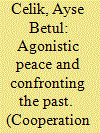

|
|
|
|
|
| Summary/Abstract |
This study analyzes how peace processes in socio-political environments that do not support ‘confronting the past’ (CTP) initiatives are affected by the exclusion and delegitimization of alternative narratives different from dominant ones concerning the nature and history of ethnic conflicts, focusing on Turkey’s failed peace process as a case study. It pays specific attention to the resistance against acknowledging alternatives to dominant narratives by considering the role played by bystanders and antagonistic citizens, who are not directly part of the conflict but nonetheless support it by remaining passive or directly/indirectly supporting dominant narratives. Driven by agonistic peace theory, the article shows how failing to turn these groups into agonistic citizens through some form of agonistic CTP initiative and allowing a space for alternative narratives can result in the fragility of efforts towards a transition to peace.
|
|
|
|
|
|
|
|
|
|
|
|
|
|
|
|
| 2 |
ID:
178178
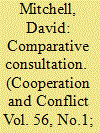

|
|
|
|
|
| Summary/Abstract |
Exchanges of expertise and experience between personnel involved in different peace processes are now a common feature of peacemaking worldwide. However, the goals, methods and impact of such interactions have been subject to little research. This article is the first scholarly analysis of what is here called ‘comparative consultation’. The article begins by conceptualising this work as a unique form of Track Two unofficial diplomacy, sharing the practical format and theoretical grounding of other Track Two approaches but differing in content. The empirical section is based on semi-structured interviews with 16 practitioners – primarily conflict resolution non-governmental organisation personnel and academics – who have facilitated dialogues on peace process topics (such as negotiation, transitional justice, grassroots peacebuilding) between peace process actors at various levels and from many contexts. It also draws on the author’s participation in a series of comparative consultation events. The findings focus on aspects of the organisation, purpose and potential, and limitations and possible risks of the practice. The conclusion sets out a model of the dimensions and potential impacts of comparative consultation and argues for its recognition as a distinct peace methodology. Avenues for further research and practice are outlined.
|
|
|
|
|
|
|
|
|
|
|
|
|
|
|
|
| 3 |
ID:
178180
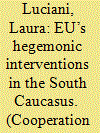

|
|
|
|
|
| Summary/Abstract |
This article draws upon poststructuralist and postcolonial theories to examine the European Union’s (EU’s) policies of human rights promotion in the South Caucasus – notably, the EU’s engagement with local human rights activists and organisations in Armenia, Azerbaijan and Georgia. Contrary to most literature, which has been concerned with policy (in)effectiveness, this article is interested in problematising the discursive foundations of this EU-civil society ‘partnership’ in the realm of human rights promotion, as well as in retrieving the agency of actors who are ‘at the receiving end’ of EU policies. It is argued that the discursive construction of ‘civil’ society as a ‘good-Other’ of the EU-Self serves as a means to depoliticise the EU’s interventions, aiming at the approximation of ‘transitioning’ countries to the EU’s human rights standards. Although the hegemonic relation requires subaltern actors to perform the ‘civil’ society identity, processes of hybridisation and subversion arise as external interventions interact with local realities and meanings. Building on in-depth interviews and ethnographic observations, the article shows how the hegemonic identity of ‘civil’ society is negotiated by South Caucasus ‘not-quite-civil’ actors striving for local legitimacy, financial survival or ownership of their human rights work.
|
|
|
|
|
|
|
|
|
|
|
|
|
|
|
|
| 4 |
ID:
178179
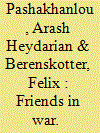

|
|
|
|
|
| Summary/Abstract |
This article scrutinizes the assumption that friends support each other in times of war. Picking up the notion that solidarity, or ‘other-help’, is a key feature of friendship between states, the article explores how states behave when a friend is attacked by an overwhelming enemy. It directs attention to the trade-off between solidarity and self-help that governments face in such a situation and makes the novel argument that the decision about whether and how to support the friend is significantly influenced by assessments of the distribution of material capabilities and the relationship the state has with the aggressor. This proposition is supported empirically in an examination of Sweden’s response to its Nordic friends’ need for help during the Second World War – to Finland during the 1939–1940 ‘Winter War’ with the Soviet Union, and to Norway following the invasion of Germany from 1940 to 1945.
|
|
|
|
|
|
|
|
|
|
|
|
|
|
|
|
| 5 |
ID:
178175


|
|
|
|
|
| Summary/Abstract |
Feminist scholars and activists have historically been written out of peace research, despite their strong presence in the early stages of the field. In this article, we develop the concept of “wifesization” to illustrate the process through which feminist and feminized interventions have been reduced to appendages of the field, their contributions appropriated for its development but unworthy of mention as independent producers of knowledge. Wifesization has trickle-down effects, not just for knowledge production, but also for peacebuilding practice. We propose new feminist genealogies for peace research that challenge and redefine the narrow boundaries of the field, in the form of a patchwork quilt including early theorists, utopian writing, oral history, and indigenous knowledge production. Reflections draw on the authors’ engagements with several archives rich in cultures and languages of peace, not reducible to a “single story.” Recovering wifesized feminist contributions to peace research, our article offers a new way of constructing peace research canons that gives weight to long-standing, powerful, and plural feminist voices, in order to make peace scholarship more inclusive and ultimately richer.
|
|
|
|
|
|
|
|
|
|
|
|
|
|
|
|
| 6 |
ID:
178177
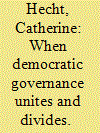

|
|
|
|
|
| Summary/Abstract |
Scholars and practitioners are increasingly attentive to contestation against symbols and institutions underpinning international order(s). Yet International Relations scholarship can benefit from greater understanding of ways in which contestation interacts with salient dimensions of social status in specific international organizations (IOs). Drawing on evidence from the history of the Organization for Security and Co-operation in Europe (OSCE), with a focus on democratic governance and human rights, this article analyzes status-related contestation as a significant, yet under-examined type of contestation in multilateral diplomacy. Status-related contestation conveys dissatisfaction about symbols, institutions, and actors which reinforce socially significant divisions that place a state (or group of states) at a social disadvantage in a particular multilateral venue. International organizations provide unique social contexts which affect the content of contestation. Building on scholarship in social psychology, constructivism, and status hierarchies in world politics, the article analyzes the evolution of a dimension (or basis) of social status in the OSCE and illustrates that, beyond domestic and material interests, state representatives communicate social identity-related concerns through language, for example, that expresses discontent with dividing lines, unfairness, or (dis)respect, in attempting to minimize negative social identities in multilateral organizations.
|
|
|
|
|
|
|
|
|
|
|
|
|
|
|
|
|
|
|
|
|